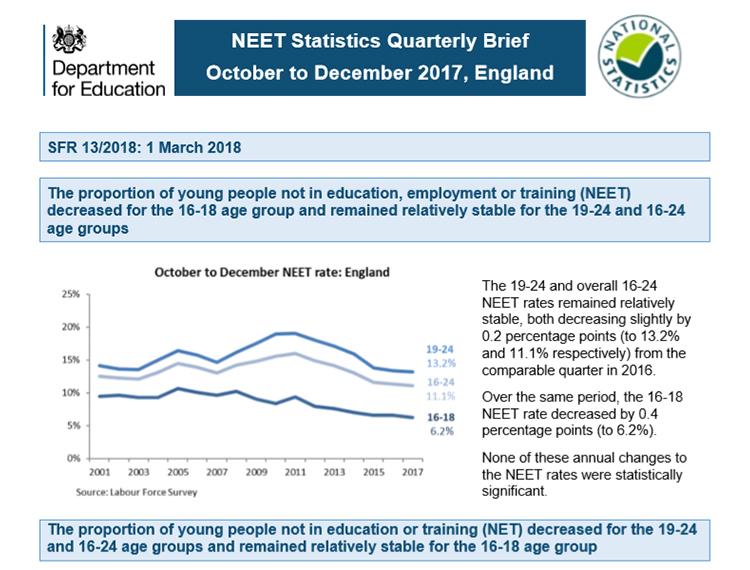More needs to be done to ensure that all young people can find rewarding employment

ONS today (1 Mar) published their NEET statistics for young people not in education, employment or training quarterly brief: October to December 2017.
In response to the publication of the latest ONS figures on young people not in education, employment or training (NEET), Kirstie Mackey, Head of LifeSkills created with Barclays, shares her recommendations on what more needs to be done to ensure that all young people can find rewarding employment.
Kirstie Mackey, Head of LifeSkills created with Barclays, comments:
“The overall decline in the number of young people not in education, employment or training over recent years is encouraging. However, as the world of work continues to change and increasingly focus on flexible working, self-employment and digital working practices, we must ensure our young people are equipped with the right transferable, future-proof skills. Businesses have a key role to play in this – we know from our research with the Education and Employers charity that students who interact with employers are significantly less likely to find themselves without employment, education or training.
“To achieve maximum impact, we need a nationwide, consistent strategic approach to employability that sees businesses, educators and the Government working together. We welcome the Government’s announcement in the ‘Good Work Plan’ that it will be developing a unified framework of employability skills as part of the technical education reforms. This framework has the potential to offer real value to the next generation and their employability education. However, we strongly believe that it needs to be much more far-reaching to ensure that all those entering the workforce – not just those in technical education – have the best platform from which to step into a rewarding and successful career. We’re calling on the Government to takes steps towards this, and to ensure that it each and every teacher and young person can benefit.”
About the LifeSkills programme
The motivation behind the LifeSkills programme is to inspire millions of young people and equip them with the key skills to move forward into the 21st century work place. LifeSkills brings together educators, businesses, young people and parents to achieve this, as increasingly young people need to leave education not only with appropriate academic results but with the skills that we know businesses need now and in the future as technology reshapes our working world.
Educators, including schools, colleges, universities, charities and youth groups, are provided with more than 60 hours of free curriculum linked employability resources, through videos, quick fire activities, interactive tools and full lesson plans to teach young people, as well as dozens of interactive tools for young people to learn in their own time or in conjunction with their parents through our dedicated parents section.
The programme focuses on three core modules; work skills, people skills and money skills. Teaching skills such as CV writing, interview skills, networking, problem solving, creativity, resilience, communication and managing online reputation.
LifeSkills also provides free support to UK businesses to help improve access to work experience opportunities – giving young people the key skills and experience they need.
Already LifeSkills is raising the aspirations of young people as they feel more confident about the future and we are seeing evidence that young people are using what they have learnt to secure employment and manage their finances more effectively. More than 5 million young people have already participated in the programme
The ONS NEET data comes from the labour force survey (LFS)
The publication includes:
- tables with national NEET estimates from the LFS for all age groups
- tables with NEET estimates by region, gender and labour market status from the LFS for:
- 16- to 24-year-olds
- 18- to 24-year-olds
- 19- to 24-year-olds
Labour market status refers to people who are:
- employed
- unemployed
- inactive (people who have either not looked for work in the last 4 weeks, or are not available to start work in the next 2 weeks)











Responses